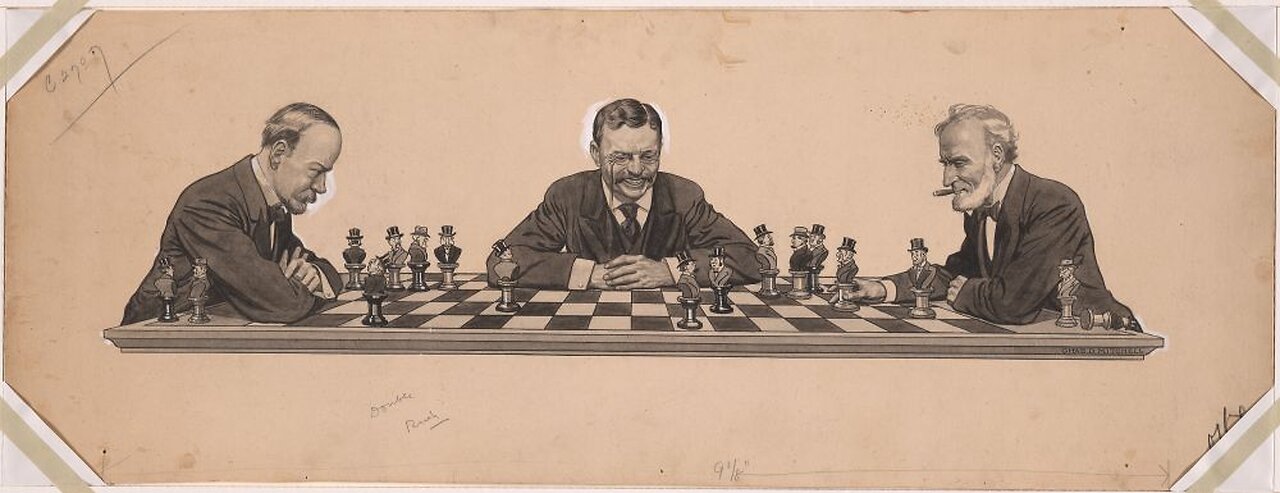Premium Only Content

"The Coming Race", Chapter IX, by Edward Bulwer-Lytton
So the Vril are vegan anarchists. Hmmm...
Regarding Zee's thesis on the parasites of a tiger's paw, the author gives us this footnote: The animal here referred to has many points of difference from the tiger of the upper world. It is larger, and with a broader paw, and still more receding frontal. It haunts the side of lakes and pools, and feeds principally on fishes, though it does not object to any terrestrial animal of inferior strength that comes in its way. It is becoming very scarce even in the wild districts, where it is devoured by gigantic reptiles. I apprehended that it clearly belongs to the tiger species, since the parasite animalcule found in its paw, like that in the Asiatic tiger, is a miniature image of itself.
I wonder why they consider any animals at all to be any significant threat, given that even a mere child could destroy an entire army. Are certain types of animals resistant to, or even immune to, vril attacks? Or is this just an oversight by the author for the sake of drama? Perhaps we will find out, there are after all many chapters to go, just have to wait and see.
The author tells us, in the next chapter when it's too late to do us any good here (i.e. I had to go back and re-record a bunch of passages to fix this in edit), what is the intended pronunciation of 'ana' and 'gy'. With the nice detail that when it comes to 'gy-ei', the plural form of 'gy', he tells us to soften the 'g' sound, BUT he doesn't tell us what to do with that 'ei'!! An 'ei' in English can be a long 'a' sound, a long 'e' sound, or a long 'i' sound. WTF dude? If you are going to give us any pronunciation help at all, give us *ALL* the pronunciation help, not just half of it!! ARGH!!
Finding words that end in 'ei'... good luck! Resorting to the Scrabble dictionary, going with purely English words that you probably know, I got one single word to work with: nuclei. The other words either aren't English, like 'lei' which is Hawaiian, or are Japanese like 'sensei', or Latin, or else are just infinitely obscure.
So, I got one word to work with. But when you consider the singular 'nucleus', the 'e' is clearly phonetically tied to the 'l', so the 'ei' here for plural form isn't properly an 'ei' diphthong that can guide us. At least, given that 'gy' to 'gy-ei' doesn't have the same pattern of an 'e' in the singular to latch on to the preceding consonant. So we are left with absolutely no idea whatsoever what to do here for pronunciation. Thanks, Ed.
The picture used is of Theodore Roosevelt, John Milton Hay, and Joseph Gurney Cannon, by Charles Davis Mitchell from about 1905. I wanted something to reflect the political science lesson being put forward in this chapter, and you can never go wrong with TR!
John Milton Hay was TR's secretary of state. Joseph Gurney Cannon was the Speaker of the House during TR's presidency, and despite also being a Republican, he was strongly opposed to TR's progressive policies. Yes, there was a time when it was the Republicans, under TR, who were the progressives. The Bullmoose Progressives! But not all Republicans were progressives, hence the split in the party in the 1912 election that enabled Woodrow Wilson to win the presidency. TR + Taft got 7.5 million votes against Wilson's 6.3 million, but it doesn't matter that TR and Taft were both Republicans, the counting doesn't work that way, and even though the population wanted a Republican, we got a Democrat. And Wilson proved to be an awful, awful president at that. Bleh. It's hard to know who to blame, TR or Taft, but TR did get more votes than Taft (4.1 million to 3.4), so make of that what you will. It's fun to talk about TR and his era, but that's a couple decades out of scope of this story with its 1871 publication date. Should be talking about Grant, which is also quite fascinating, if you like case studies in political corruption. Oh, and the narrator mentions he is from New York City, so it is worth nothing that Boss Tweed is still running Tammany Hall, and the city, in 1870 and 71. It's his final years, his political demise is imminent, but his corruption is beyond astronomical! The most extreme political corruption was the order of the day at all levels, in all places, at least in the USA. So it seems the author is being *extremely* sarcastic when he puts forth the American model as the pinnacle of political evolution :-P
To follow along: https://www.gutenberg.org/files/1951/1951-h/1951-h.htm#link2HCH0009
-
 12:42
12:42
Cooking with Gruel
18 hours agoBrown Butter Trifle with Salted Caramel and Cinnamon Apple
7591 -
 2:46
2:46
BIG NEM
6 hours agoDiscovering RAKIJA: The Holy Liquer of the Balkans
442 -
 1:11:38
1:11:38
Film Threat
11 hours agoCHRISTMAS DAY CHILL STREAM WITH CHRIS GORE | Hollywood on the Rocks
123K24 -
 14:22:40
14:22:40
The Quartering
1 day agoYule Log Christmas MAGA Edition With Memes! Come Hang Out!
213K29 -
 38:41
38:41
MYLUNCHBREAK CHANNEL PAGE
1 day agoTimeline Begins in 1800? - Pt 1 & 2
94.6K49 -
 1:23:41
1:23:41
Game On!
1 day ago $13.01 earnedNetflix NFL Christmas Games Preview and Predictions!
84.9K13 -
 2:05:07
2:05:07
Darkhorse Podcast
1 day agoWhy Trump Wants Greenland: The 257th Evolutionary Lens with Bret Weinstein and Heather Heying
313K725 -
 8:50:58
8:50:58
Right Side Broadcasting Network
1 day ago🎅 LIVE: Tracking Santa on Christmas Eve 2024 NORAD Santa Tracker 🎅
412K62 -
 2:48
2:48
Steven Crowder
1 day agoCROWDER CLASSICS: What’s This? | Nightmare Before Kwanzaa (Nightmare Before Christmas Parody)
361K13 -
 33:49
33:49
Quite Frankly
1 day agoThe Christmas Eve Midnight Telethon
148K30